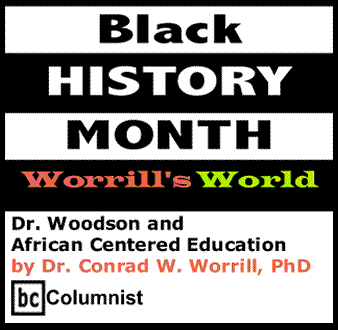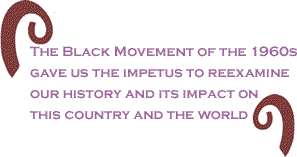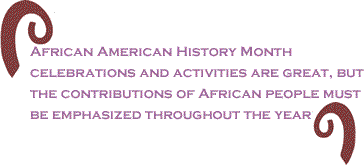
|
|||||||||||||||||||||||

|
|

Custom Search
|
|
 |
|
The African Centered Education Movement has brought a new meaning to the annual African American History Month celebrations that have become so popular. That new meaning of African Centered thought, as defined by Dr. Wade Nobles, “is nothing more than a term categorizing a quality of thought and practice which is rooted in the cultural image and interest of African people and which represents and reflects the life experiences, history and traditions of African people as the center of analyses.” With this definition it is clear that we must study the liberation of African people. Dr. Nobles further states that African Centered thought is, “the intellectual and philosophical foundations upon which African people should create their own scientific criterion for authenticating human reality.” Through the African Centered Education Movement, African American History Month has now become the catalyst for the intense study of Africa and the history of African people throughout the world 365 days a year. We must pay particular attention in our studies to the history of the Reparations Movement. Dr. Carter G. Woodson, who founded, in February of 1926, what at that time was called “Negro History Week,” would indeed be inspired by the continuing discussion and debate over the infusion of the contributions of African people in all subjects. Dr. Woodson was deeply concerned that the contributions of African people to this society and the world were not given their proper recognition. Dr.
Woodson’s great book The
miseducation of the Negro Dr. Woodson explained that, “Of the hundreds of Negro high schools recently examined (1933) by an expert in the United States Bureau of Education only eighteen offer a course taking up the history of the Negro, and in most of the Negro colleges and universities where the Negro is thought of, the race is studied only as a problem or dismissed as of little consequence.” Continuing on, Dr. Woodson gave an example of, “an officer of a Negro university, thinking that an additional course on the Negro should be given there, called upon a Negro Doctor of Philosophy on the faculty to offer such work. He promptly informed the officer that he knew nothing about the Negro. He did not go to school to waste his time that way. He went to be educated in a system which dismissed the Negro as a nonentity.” Obviously,
since the writing of this great book, we have come a long way in
our battle against challenging the white supremacy foundation The Black Movement of the 1960s gave us the impetus to reexamine our history and its impact on this country and the world. This movement brought on renewed interest, on the part of our people, to study our history. We moved from the use of the term “Negro” in referring to ourselves and began to use “Black” as the more appropriate way to describe who we are. We went from Black History Week to Black History Month. In fact, some of us began to refer to the month of February as Black Liberation Month. It was through the movement of the 1960s, particularly the Black Power Phase that we began to re-identify with our homeland - Africa, and the interconnection of African people throughout the world. The Black student movement of the 1960s sparked demands for courses in Black Studies that lead to the famous strike at San Francisco State University. After a long battle with the administration of the university, the students finally won a victory for the first Black Studies Program to be established at an American college or university. As a result, a movement for Black Studies erupted all over America and stimulated at the elementary and secondary levels, demands for courses dealing with Black History.
As we have come full circle today in our general acceptance of being African People, whose ancestral homeland is Africa, we are also beginning to recognize that African American History Month celebrations and activities are great, but the contributions of African people must be emphasized throughout the year. There is no question that the setting aside of the month of February, as an extension of Dr. Woodson’s original idea of “Negro History Week” is something we need vigorously to continue to support and institutionalize. We are quite clear that the real meaning of African American History Month, in this era, is to take the spirit from all the celebrations, great speeches, great entertainment and festive events to establish as a major agenda item in our movement, the serious study, 365 days a year, of the contributions of African people. The objective of the current African Centered Education Movement is to take control of the education of African people in America, as we struggle to insure that the truth is taught in all institutions, in our communities and particularly in our schools. We must take the spirit of African American History Month to another level. Our history must be studied throughout the year! BlackCommentator.com columnist Conrad W. Worrill, PhD, is the National Chairman of the National Black United Front (NBUF). Click here to contact Dr. Worrill. |
|
Any BlackCommentator.com article may be re-printed so long as it is re-printed in its entirety and full credit given to the author and www.BlackCommentator.com. If the re-print is on the Internet we additionally request a link back to the original piece on our Website. Your comments are always welcome. eMail re-print notice
If you send us an eMail message we may publish all or part of it, unless you tell us it is not for publication. You may also request that we withhold your name. Thank you very much for your readership. |
|
| |
|
| February
26, 2009 Issue 313 |
|
| Executive Editor: Bill Fletcher, Jr. |
| Managing Editor: Nancy Littlefield |
| Publisher: Peter Gamble |
| Est. April 5, 2002 |
Printer Friendly Version
in resizeable plain
text format or pdf
format. |
| Frequently Asked Questions |
 |

|
 |
 |
 |
| |
| |





































